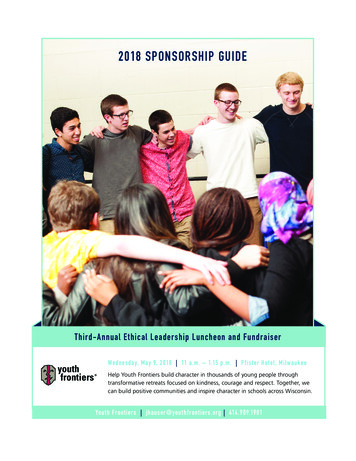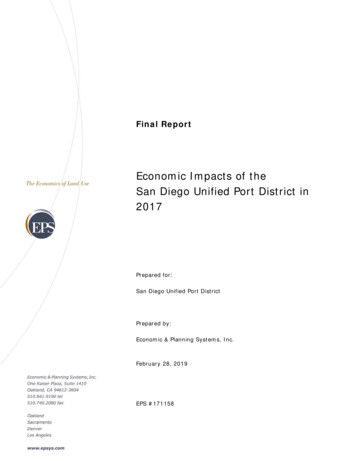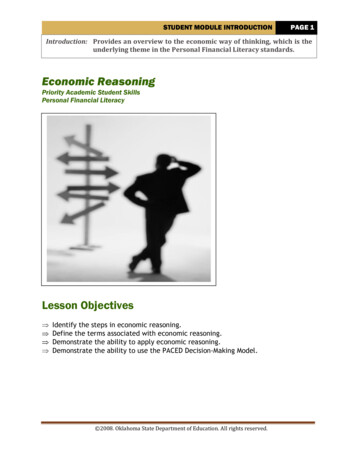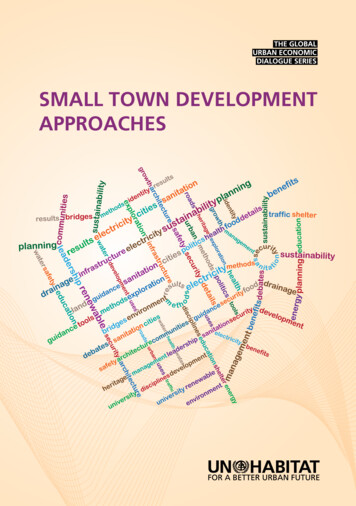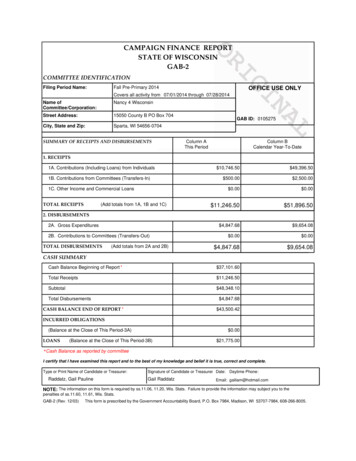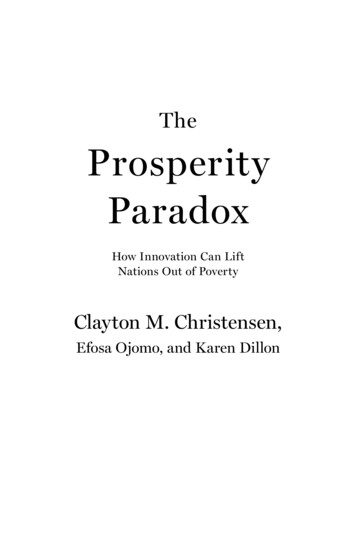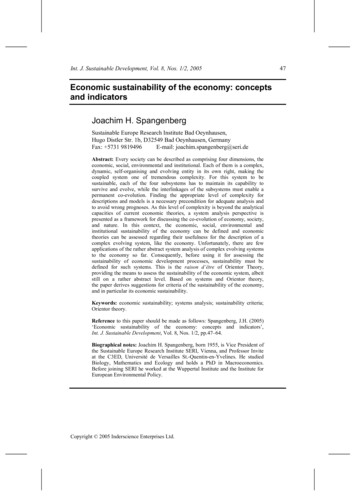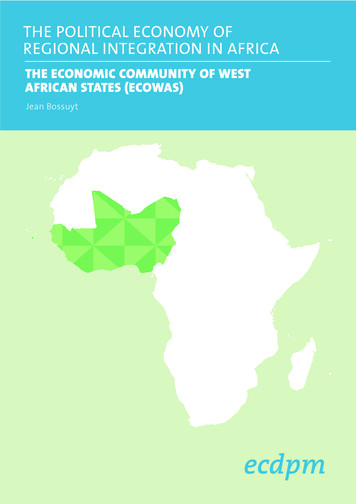
Transcription
THE POLITICAL ECONOMY OFREGIONAL INTEGRATION IN AFRICATHE ECONOMIC COMMUNITY OF WESTAFRICAN STATES (ECOWAS)Jean Bossuyt
Political economy of regionalintegration in AfricaThe Economic Community of West African States(ECOWAS) ReportJean BossuytJanuary 2016
ECOWAS Studyhttp://ecdpm.org/peria/ecowasMEMBER COUNTRIES: 15BeninBurkina FasoCape VerdeCôte igerNigeriaSenegalSierra LeonTogoECOWAS Member States
ECOWAS Studyhttp://ecdpm.org/peria/ecowasTable of ContentsAcknowledgements . i!Acronyms . ii!Executive Summary . iv!1.! Introduction . 1!1.1.!Why this study of the ECOWAS? . 1!1.2.!Why a political economy analysis? . 1!1.3.!Methodology of the study . 2!1.4.!Scope and structure of the ECOWAS analysis . 4!2.! General ECOWAS features . 5!2.1.!Foundational factors . 6!2.2.!Institutional factors, actors and incentives . 9!2.3.!Inter-regional dynamics . 14!2.4.!External factors . 15!2.5.!Cross-cutting issues: Gender . 16!3.! ECOWAS in the area of peace and security and governance . 18!3.1.!Sector characteristics . 18!3.2.!ECOWAS and the conflict in Mali. 20!3.3.!ECOWAS and the political crisis in Ivory Coast and Burkina Faso . 27!3.4.!Conclusion . 34!4.! The role of ECOWAS in food security . 36!4.1.!Food security in West Africa . 37!4.2.!The domestication of CAADP and ECOWAP policies in Burkina Faso . 39!4.3.!Regional food security and the private sector – the case of rice and livestock . 45!5.! Final conclusions . 52!5.1.!Key findings . 52!5.2.!Implications . 54!Bibliography . 56!Annex 1: List of interviews . 58!List of BoxesBox 1: Key phases of the process and related policy responses . 22!Box 2: Main bottlenecks and challenges in the rice sector . 38!Box 3: Key private sector players in the ECOWAS region . 46!Box 4: Changes in Nigeria’s trade policies with a view to safeguard the effectiveness of national ricestrategies. 47!Box 5: The rice producers and collective action around the Common External Tariff (CET) . 50!
ECOWAS Studyhttp://ecdpm.org/peria/ecowasList of FiguresFigure 1: Distribution of the 2010 budget for the Programs of the ECOWAS Commission per departments. 12!
ECOWAS This study is part of a broader project analysing the political economy of the African Union and RegionalEconomic Communities in Africa. It is funded by the Embassy of Sweden in Nairobi.The authors acknowledge this support, as well as the contributions from the African and European experts,the peer reviewers, the Swedish Quality Assurance Group, and of course the many African partners whodedicated time and shared their insights and wisdom.This study was coordinated by Jean Bossuyt.Jean Bossuyt was the lead author of the ECOWAS report, with contributions from Anna Knoll and SophieDesmidt (authors of the peace and security section related to ECOWAS in the Mali crisis), Zakaria Amar(who contributed to the section on unconstitutional changes of government) as well as Fabien Tondel,Carmen Torres and Roger Blein (who carried out the studies on agriculture and food security). Stella Sabiitiparticipated as African expert in the mission to ECOWAS Headquarters.The authors of this study are responsible for its content, interpretations and any errors.i
ECOWAS IAll Farmers Association of NigeriaAfrican-led International Support Mission to MaliAl Qaeda in the MaghrebAfrican Peace FacilityAssociation des pasteurs éleveurs du Sahel et de la SavaneAfrican Peace and Security ArchitectureAfrican Standby ForcePresident Amadou Toumani TouréAfrican Security Sector NetworkAfrican UnionBrazil, Russia, India, China, South AfricaComprehensive Africa Agriculture Development ProgrammeCommunauté Économique des États de l' Afrique CentraleCentral African Economic and Monetary CommunityCommon external tariffComité Permanent Inter-États de Lutte contre la Sécheresse dansle SahelComité Interprofessionnel du Riz du BurkinaConfederation of National Federations of cattle-meatCommon Market for Eastern and Southern AfricaCadre Régional de Concertation des Organisations de Producteursde RizCivil Society OrganisationFood and Agriculture OrganisationForum of Associations Recognized by ECOWASEast African CommunityEconomic Community of Central African StatesECOWAS Community Court of JusticeECOWAS mission in Cote d'IvoireECOWAS Ceasefire Monitoring GroupECOWAS Fund for Agriculture and FoodECOWAS Agricultural PolicyECOWAS Early Warning and Response NetworkEconomic Community of West African StatesECOWAS Environmental PolicyECOWAS Conflict Prevention FrameworkEuropean Development FundECOWAS Gender Development CentreEconomic Partnership AgreementECOWAS Peace FundECOWAS Standby ForceECOWAS Trade Liberalisation SchemeEuropean UnionGross Domestic ProductInformal cross border tradeInternational Food Policy Research Instituteii
ECOWAS Phttp://ecdpm.org/peria/ecowasIntergovernmental Authority on DevelopmentInternational Monetary FundInstitute for Security StudiesLeast developed countriesMano River Women Peace NetworkECOWAS Mission in MaliUN Multidimensional Integrated Stabilization Mission in MaliMediation and Security CouncilMovement for Unity and Jihad in West AfricaNational Agricultural Investment PlanNew Partnership for Africa’s DevelopmentNon-Governmental OrganisationNational Rice Development StrategyOrganisation for Economic Co-operation and DevelopmentPolitical Affairs, Peace and SecurityProgramme national du secteur ruralECOWAS Water Resources PolicyPeace and Security CouncilRegional Agency for Food and AgricultureRegional Agricultural Investment PlanRegional Economic CommunitiesRice Farmers Association of NigeriaRéseau des Organisations Paysannes et de Producteurs del’Afrique de l'OuestSouthern African Development CommunityTroop Contributing CountriesUnion des Organisations de la Filière AvicoleUnion économique et monétaire ouest-africaineUnited NationsUnited Nations Operation in Côte d'IvoireWest African Economic and Monetary UnionWest Africa Network for Peace buildingiii
ECOWAS Studyhttp://ecdpm.org/peria/ecowasExecutive SummaryThis study presents a political economy analysis of the Economic Community of West African States(ECOWAS), focusing in particular on what drives and hampers this regional organisation in preventing andresolving conflicts in West Africa, and in promoting a regional approach to agriculture and foodsecurity. The report is part of a broader study that includes the African Union and four other RegionalEconomic Communities in Africa.Why a political economy study of ECOWAS?The Economic Community of West African States (ECOWAS) was established in 1975 with the formal aimof promoting economic co-operation between 15 countries with different historic trajectories (colonisation,language, and administrative cultures) yet sharing similar socio-economic conditions. During the 1980s theregional body was confronted with a large number of political crises, ranging from civil war to variousmilitary or constitutional coups d’état. This forced ECOWAS to fully embrace the security agenda as a ‘corebusiness’.The region is widely recognised as a trailblazer, including for the African Peace and Security Architecture(APSA). Several crises have been effectively addressed through regional diplomacy and militaryintervention. Over the years, ECOWAS has sought to promote an ever-widening regional integrationagenda through a wide variety of strategies, action plans and programmes. Initially the regional bodyfunctioned through a state-centric, top-down approach to promoting regional integration. From the 1990sonwards, there were deliberate attempts by ECOWAS to also spur regional dynamics ‘from below’ throughclose collaboration between institutional actors, civil society and business organisations.thECOWAS recently celebrated its 40 Anniversary. In reviewing the track record of the organisation, mostanalyses concur that important achievements were obtained in different domains, including restoringpeace, containing conflicts, dealing with rigged elections, facilitating the free movement of people orsupporting infrastructure development (trans-coastal and trans-Sahelian roads).Yet there is also a broad recognition that the initial aspirations have not been met. Overall progress in theactual implementation of ECOWAS policies in core areas such as trade, economic and monetarycooperation, energy and social development has been limited. There are still many obstacles to the freecirculation of people (such as the existence of numerous check points, arbitrary and discriminatorytreatment of citizens of other countries, migration laws) and goods (including the non-application of theECOWAS Trade Liberalization Scheme, illegal tariff barriers, and non-tariff barriers). Other urgent crisesremain unaddressed. The Sahel is being increasingly destabilised by cross-border crime, drug trafficking,the Tuareg conflict, terrorism and the spread of Al Qaeda in the Islamic Maghreb. The envisaged transitionin the Vision 2020 from an ‘ECOWAS of States’ to an ‘ECOWAS of People’ has still a long way to go,particularly in terms of delivering tangible outcomes for citizens.However, in assessing the performance of ECOWAS one cannot ignore the particularly harsh political,institutional and socio-economic conditions in which the integration project had to be pursued. The regionranks particularly low regarding all human development indicators. Thirteen ECOWAS countries areclassified in the low Human Development category and 60 per cent of the population is estimated to live onless than one dollar a day. This brings along major shortcomings in policy and institutional capacity acrossthe board.iv
ECOWAS Studyhttp://ecdpm.org/peria/ecowasThis study of ECOWAS tries to provide insights that explain the implementation gap, as these may helpinform, calibrate and target reforms as well as support efforts that are technically desirable and politicallyfeasible. To do so, the study focuses on the key drivers and constraints that shape the ECOWAS agendaand influence implementation by analysing two policy areas: peace and security and food security(focusing on the agricultural sector and agro-food industries and trade). The study uses a political economyframework to answer two core questions: how do key actors and factors affect and shape the agendasetting of ECOWAS? And how do these different actors and factors influence what gets implemented andwhy?Key findings of the ECOWAS studyECOWAS was primarily created to promote economic cooperation within the region. To pursue this aim, itadopted at its inception an intergovernmental approach to governance, based on national sovereignty andnon-interference in the affairs of its member states. The regional commitment at that time was essentiallythat member states would integrate the lofty ambitions of ECOWAS in planning and directing their national(economic) policies. It resulted in a system whereby decision-making power lies exclusively with theAuthority of Heads of State and Government and the ECOWAS Secretariat is merely charged with the taskof executing the decisions taken by it.Already in the early 1990s a ‘Committee of Eminent Persons’ concluded that effective integration could notbe stimulated under these conditions and pleaded for the adoption of a supra-national approach togovernance in order to speed up decision-making and enforce compliance. In 2006 the ECOWAS Summitformally decided to carry out institutional reforms to give more teeth to the regional body, including turningthe Executive Secretariat into a ‘Commission’ and further developing formal structures and institutionalarrangements (such as the ECOWAS Parliament, the ECOWAS Community Court of Justice and a host ofdialogue mechanisms with private sector and civil society organisations in various areas). ECOWAS is theonly REC that was able to formally establish a Community levy, which helps to increase its legitimacy andscope for autonomous action (though member states do not always live up to their commitments and donordependency for programmes remains high).However, the effective and coherent use of this formal architecture has proven to be quite challenging.Decision-making power remains firmly anchored in the Authority and Council. The Commission canpropose initiatives and actions plans, yet there is no shortage of examples where policy developmentshave been postponed despite their apparent urgency from a regional perspective; where the ratification bymember states of protocols and acts incurs major delays; where agreed policies are not translated atnational level or implemented in a consistent way at regional level; where decisions of the Court areneglected by member states, and so on. This suggests the ECOWAS Commission has only limited spaceand power to effectively contribute to the production of regional public goods.This limited track record in implementing regional decisions, in turn, shows that ownership levels of thewhole regional construct are low across the board. This is linked to the pervasive development challengesfaced at national level, the limited institutional capacities, the lack of trust among member states and aboveall to the interests driving elite behaviour. Most of the incentives faced by national politicians are not relatedto regional integration. They are focused on satisfying short-term clientelist demands at national and subnational level. The problem is compounded by the still prevailing culture of top-down decision-making –despite the existence of formal mechanisms to involve relevant stakeholders. As a result, it has provendifficult to create sufficient political support for the integration process among domestic constituencies.v
ECOWAS Studyhttp://ecdpm.org/peria/ecowasThis overall political economy reality can be illustrated by the role of ECOWAS in core policy processessuch as peace and security or food security. Though primarily a regional body focusing on economicintegration, ECOWAS was forced to step into the peace and security realm in order to address wars andconflicts. The proliferation of conflicts in the region is linked to foundational factors such as historicaltrajectories, colonisation by different European powers, geography and natural endowments ordemography. As a result, most countries in the region remain fragile states with limited social cohesion,common sense of identity or shared development vision. Inequalities are growing, increasing the chance ofconflicts around access to resources and land. These material conditions explain to a large extent thechronic instability of the region as well as the generally poor levels of governance across the region.These conditions also help to understand why powerful member states (particularly regional hegemonNigeria) had a strong incentive to use ECOWAS to prevent the regionalisation of wars and conflicts andrelated collateral damage (though its leadership has recently been weakened as a consequence ofdomestic turmoil). It allowed ECOWAS to display a selective ability for collective action to address politicalcrises in member states (i.e. Ivory Coast, 2010-2011). In other cases the incentives were not present togenerate a timely and relevant political response (i.e. Burkina Faso, 2014) with the resulting loss ofcredibility in the eyes of citizens. Other case material suggests that pervasive internal governance andmanagerial and leadership deficiencies all along the decision-making chain hamper the delivery of concreteresults (as shown in the peacekeeping operation planned for Mali which could not be effected). Theproliferation of actors with their own specific interests and overlapping mandates can make the task ofdefining coherent regional responses daunting. The difficult relation between ECOWAS and the AU is acase in point, yet similar complications arise from the many external interventions.The implementation gap is also visible in the area of agricultural development and food security. From2000 onwards, ECOWAS increased its profile in promoting a regional approach to agriculture and foodsecurity, supported at the continental level by the Comprehensive Africa Agriculture DevelopmentProgramme (CAADP). The 2008 food crisis provided additional momentum and incentives for acceleratingreforms in the region. The ECOWAS Commission has acted as convenor of multi-actor dialogueprocesses, developed a wide range of policy initiatives and committed significant resources to support theeffective domestication of continental and regional agricultural and food security agendas. Yet theECOWAS Commission has little power and a limited set of incentives to offer for acceleratingimplementation (for instance, with regard to the ECOWAS Trade Liberalisation Scheme, ETLS). This islinked to various factors such as (i) the primacy of national policy interests and considerations (e.g. fornational food sovereignty); (ii) the hugely diverging interests among member states (e.g. Nigeria versusfrancophone/WAEMU states in the rice sector; and Sahel countries versus coastal countries in thelivestock sector); (iii) the deep-rooted regionalisation dynamics pushed forward by state and non-stateactors (operating through informal channels and networks) that challenge state territorial control andregional policies alike.Despite strengthening private sector and civil society organisations at regional level, their bargaining powerand capacity to act and influence core regional policies in a coherent and effective manner remain limited.This is closely linked to diverging interests between actors artificially classified together as ‘the regionalprivate sector’. Reference can be made to the diverging interests between importers of staple foodcommodities (notably rice), who constitute powerful oligopolies, have a strong influence on the political eliteand extract rents from constrained local production capacities and segmented regional markets; and localproducers (farmers and other operators), who are more atomised, further undermining regional-level actionto support local and regional agro-food value chain development.vi
ECOWAS Studyhttp://ecdpm.org/peria/ecowasAll this is not to say that collective action is not taking place. Yet when it occurs it does not tend to followformalised rules and procedures. ECOWAS rather seeks to foster compliance in an indirect manner,through soft mechanisms of dialogue and persuasion. The co-existence of ECOWAS with WAEMU is aclear sign that a ‘single’ regional body may not be the appropriate way forward for West Africa. A multilayered pattern of regional frameworks allows for more coherent forms of interest articulation (as reflectedin the monetary union around the CFA in the francophone member states or the complementary rolesplayed by ECOWAS and WAEMU in agriculture and food security).ImplicationsThese findings carry important implications for stakeholders interested in closing the implementation gapand building more effective forms of regional cooperation through ECOWAS. Key aspects for considerationrelate to the level of ambition of future policies, appropriate sectors or policy areas for action, and selectionof partners and stakeholders in programme design and implementation: Several structural factors continue to have a major influence on current dynamics and institutions.These need to be properly recognised and incorporated in the design of realistic support strategies. Forinstance, the co-existence of ECOWAS and West African Economic and Monetary Union (WAEMU) isan illustration of the various historical trajectories of the countries. Grand schemes aimed at mergingthe two bodies or working out a rational division of labour are likely to encounter major difficulties. Theevolution and relevance of both structures will depend on the policy issue at stake and related capacityof the regional bodies involved to generate collective action. The cases addressed in this study indicate that the set of incentives and capacity for meaningfulregional action tend to vary greatly according to sectors and even sub-sectors of intervention. In peaceand security, coalitions were possible between ‘willing’ member states (generally individual Heads ofState) and the Commission. This facilitated application of the existing regional arsenal of norms andtools. In the agricultural domain, the regional trigger proved less powerful to defining a shared vision,providing powerful incentives to member states to implement CAADP/ECOWAS plans or challengingthe predominantly national focus on policy-makers. This huge diversity of political economy contextscalls for a much more down-to-earth and tailored approach to promoting regional integration dynamics.It also implies making use of critical junctures while diversifying the possible ‘entry points’ for regionalaction (sometimes smaller informal alliances of member states or specialised regional structures arebetter conducts to get political traction and action). While there is space for multi-actor approaches to regional policy formulation and implementation,there are also constraints hampering the ability of non-state actors to play a positive role as ‘normentrepreneurs’ or ‘drivers’ of regional integration agendas. Beyond major challenges of capacity,organisation and funding, regional networks may end up being ‘too close for comfort’ (this danger ofco-optation stems from the deeper nature of state-society relations in the region, often characterised bydependency and clientelist relationships). Yet one should avoid over-simplifications. ‘Regional’ actorscan be identified in different policy domains that are acting on principles and beliefs about regionalidentity. With targeted institutional support they could be further enabled to demand specific regionalreforms ‘from below’ through coalitions sharing similar interests. The study shows how ECOWAS is often not performing its role according to a clear set of formal,transparent and institutionalised rules respected by all. The Commission rather follows an ad hoc path,looking for windows of opportunities to play the role of an informal broker or foster compliance, in closevii
ECOWAS Studyhttp://ecdpm.org/peria/ecowasalliance with ‘willing’ or ‘reformist’ states and through ‘soft mechanisms’ of dialogue and persuasion.Future institutional support programmes could try to strengthen formal and informal interfaces, dialoguemechanisms and coordination structures with member states as well as with the AU at different levels(as a key condition for more effective collective action). They could also seek to further enableECOWAS in its role as a credible and accountable broker–equipped with the necessary politicalintelligence to know when and how it can usefully intervene. The external influence on the regional integration process is huge, firmly engrained in history andreflected in a proliferation of external actors often intervening at cross-purposes. In such a crowdedarena, it is not easy for ECOWAS to carve out its own space and deliver added value (includingtowards the AU). Despite the existence of own resources, levels of aid dependency are high,particularly for regional programmes. The main challenge for donors is to align much closer to the realpolitical economy dynamics prevailing in a given sector or policy area (linked to power relations,incentives and interests) rather than towards formal players and processes.viii
ECOWAS Studyhttp://ecdpm.org/peria/ecowas1. Introduction1.1.Why this study of the ECOWAS?Enhancing regional integration and cooperation have long been high on the agenda for African countries,regions and their organisations. There is wide recognition that regional cooperation is vital to tackledevelopment challenges that cannot be solved at a national level. Many such inter-state problems affectpoor people’s lives in areas ranging from human security, mobility, rural livelihoods, trade, infrastructure, toenvironment and climate change. Often such cross-country or regional problems have a particular impacton women, for example in the case of informal cross-border trade and violent conflicts. Over the years, thishas resulted in commitments, policy documents and strategies, with many partners providing financial andother support. Yet policy-makers and partner country representatives and non-state actors frequentlyexpress frustration with progress.This is no different for the Economic Community of West African States (ECOWAS). While the initial driveto create ECOWAS in 1975 was economic integration, the regional body has, over its almost 40 years ofexistence, had to deal with a high number of political crises, ranging from civil war to various military orconstitutional coups d’état. These circumstances forced ECOWAS to fully embrace the security agenda asa ‘core business’ during the 1990s. Several crises have been effectively addressed through regionaldiplomacy and military intervention. The region is widely recognised as a trailblazer, including for theAfrican Peace and Security Architecture (APSA). From 2000 onwards, ECOWAS increased its profile inpromoting a regional approach to agriculture and food security, supported at the continental level by theComprehensive Africa Agriculture Development Programme (CAADP). The 2008 food crisis providedadditional momentum for accelerating reforms in the region. While progress has been achieved, structuralbottlenecks hamper effective regional approaches.This study seeks to unpack some of the reasons explaining the track record of ECOWAS in both policyareas. The report does this by adopting a political economy analysis approach.1.2.Why a political economy analysis?Analysing and understanding the complexities in regional processes have posed many problems.Sometimes the analysis is misguided by a too narrow focus on one dominant regional model, such as theEuropean Union (EU). In other cases, the analysis gets side-tracked as it considers regional organisationsto be the sole drivers for regional integration.Rather than foc
Comprehensive Africa Agriculture Development Programme Communauté Économique des États de l' Afrique Centrale Central African Economic and Monetary Community . (economic) policies. It resulted in a system whereby decision-making power lies exclusively with the Authority of Heads of Stat

